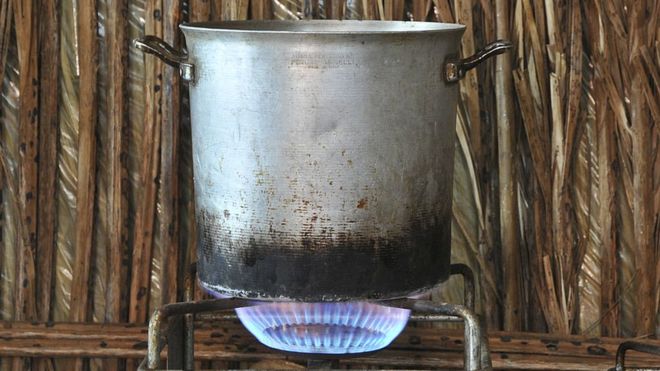African countries are experiencing a rise in the number of new coronavirus cases, and many governments have been enforcing strict social distancing measures.
As they prepare for a surge in cases, misleading information has been spreading throughout the continent.
- Inhaling very hot steam is dangerous
The false claim that inhaling steam is an effective treatment against coronavirus has surfaced once again, this time in Tanzania with an endorsement by its president.
As part of an appeal to put more emphasis on traditional cures, President John Magufuli has said inhaling steam kills off viruses in the nose and the mouth.
Mr Magufuli suggested that high temperatures would work against the virus during remarks about the best strategy to tackle the coronavirus crisis.
But although high temperature steam treatment is used for industrial cleaning in places such as hospitals, inhaling it at these temperatures would be extremely dangerous to the human body, according to Keith Neal, a specialist in the spread of infectious diseases at the University of Nottingham in the UK.
Live tracker: The coronavirus in Africa
He points out that if steam that hot got inside your body in attempt to kill the virus, your lungs would also be irreparably damaged.
Also, water vapour rising from a boiling pan would be quickly cooled as it enters the body and not be hot enough to have an effect against the virus.
The World Health Organization (WHO) has warned against taking very hot baths to stop the virus, saying this could burn you.
2.Chinese-owned businesses in Nigeria were not attacked
As reports about Africans facing discrimination in China have emerged, some people have started spreading fake videos, claiming they show people retaliating against the Chinese community in Africa.
A case in point is a video said to show a Chinese-owned business on fire in Nigeria.
The images actually show shops on fire at a popular market area in Ibadan in south-west Nigeria this month.
The Punch newspaper in Nigeria reported on the fire and refers to Nigerian traders with no mention of Chinese businesses.
The video which has been viewed more than a million times was later pulled by Twitter because they said “it violated Twitter rules”.
- Consuming alcohol does not protect against Covid-19
The governor of Kenya’s capital, Nairobi, has been criticised for misleading remarks about alcohol and the coronavirus.
Governor Mike Sonko was explaining why he is including bottles of Hennessy cognac in food supplies for vulnerable people in the city, saying it would serve as a “throat sanitiser”.
“From the research which has been conducted by World Health Organization (WHO) and various health organisations it has been revealed that alcohol plays a very major role in killing the coronavirus, or any sort of virus,” he said.
He appears to have misinterpreted WHO health advice. It says drinking alcohol does not protect you against the coronavirus, but it does refer to the efficacy of alcohol-based gel to clean your hands.
The WHO advice adds that alcohol consumption “is likely to increase the health risks if a person becomes infected with the virus”.
Hennessy, the manufacturers of Hennessy cognac, have also cautioned Kenyans against consuming alcohol with the belief that it will offer protection.
- Blue facemasks are not contaminated
Two posts on Facebook, which have been urging Africans not to wear blue face masks amid claims they are contaminated with toxins, have been widely shared
The first post claims to be quoting Amazon founder Jeff Bezos and a supposed scheme to distribute contaminated masks.
“Dear Africans, avoid wearing the blue masks that are made in America and Europe because these masks contain suicidal toxic [sic]” the post reads. It doesn’t explain what toxins they are supposed to contain.
Amazon says the quotes have been fabricated.
A post on another page – this time falsely quoting the head of the World Health Organization – also urges people not to wear blue masks.
Mary Stephen, from the WHO regional office for Africa, told the BBC the organisation hasn’t received any reports of contaminated masks.
“Countries are sourcing their masks from different sources, and we are not aware of any contamination,” she says.
Source : BBC































